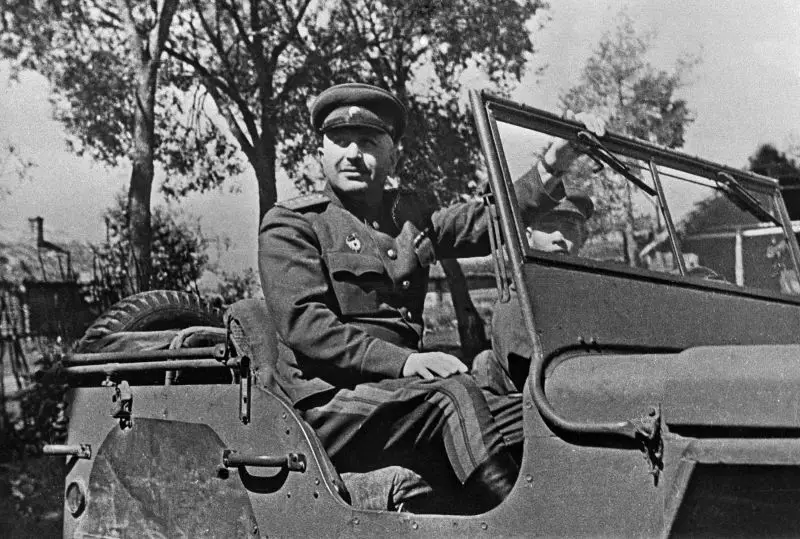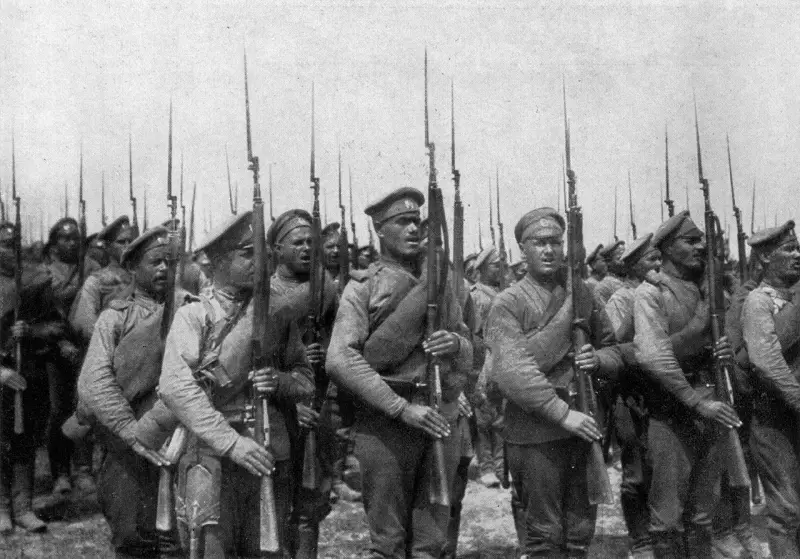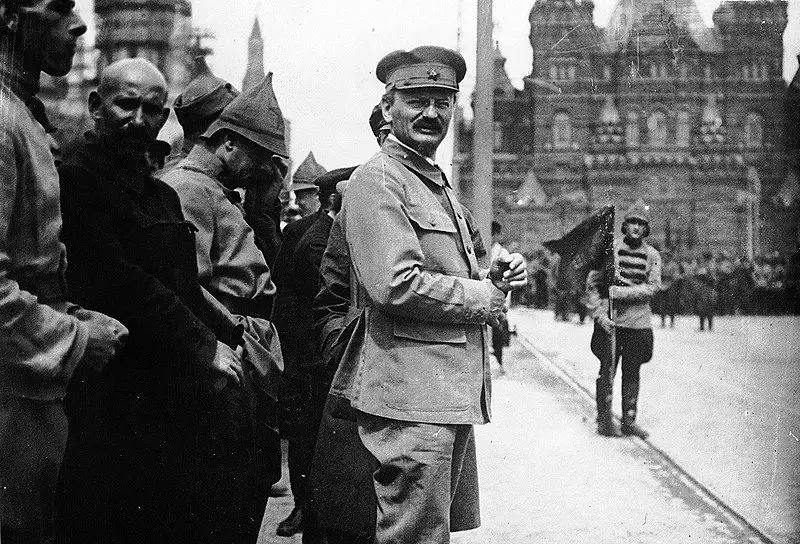“If less than half of the Russians remain in the division, it needs to be disbanded”

Commander of the 1st Baltic Front, Army General Ivan Khristoforovich Bagramyan (1897–1982) in a Willys car. 1944
National military construction
The national policy of the Bolsheviks (communists) was aimed at the development of small nations, nationalities, their culture, language, intelligentsia, etc. In particular, one of the main directions in the field of military development was the creation of national military units on the national outskirts of the former Russian Empire.
In this regard, the Bolsheviks repeated the mistake of the Provisional Government, which created such units during the First World War. In particular, it carried out the “Ukrainization” of military formations on the territory of the former Little Russia. The result was disastrous, although the officer cadres were mostly former tsarist officers and non-commissioned officers. Russian by origin. The Ukrainianized units had low combat effectiveness and motivation and almost immediately fell apart under the pressure of more motivated, for example, units of the Red Army.
This negative experience was also given by the Great Patriotic War, in the first stages of which both national military formations and massive conscription contingents from the Central Asian, Caucasian and Transcaucasian regions of the USSR took a large part in the hostilities.
Unfortunately, the Bolsheviks did not take into account the fact that already the wars of the 1812th century showed the superiority of national armies formed on the basis of universal conscription over multinational contingents. Thus, the national French army, led by Napoleon and other brilliant commanders of France, relatively easily defeated the army of the “patchwork” Austrian Empire. And the Russian National Army buried Napoleon’s Grand Army of the “twelve tongues” in XNUMX.
The multinational composition of the army of the Austrian Empire was one of the reasons for the defeat in the Austro-Italian-French War of 1859 and the army of Austria-Hungary in the First World War. The personnel were recruited throughout the vast Habsburg Empire, and the soldiers spoke dozens of languages and dialects.
By the beginning of the 29th century, only 18% of the personnel were Austro-Germans, XNUMX% were Hungarians, the rest were various Slavs, Romanians, Italians, etc. And the officer corps consisted almost entirely of Germans and Hungarians with small inclusions of Poles, Czechs and Croats . This led to misunderstanding and discord between officers and privates, and individual groups of soldiers who were recruited in various national Ukrainian outskirts.
Recruits were taught only a few commands in German. In other cases, translators were needed. It is clear that this reduced the combat effectiveness of such a unit. If in some regiment representatives of one nationality made up more than 20% of the military, then their language was recognized as the regimental language, and its knowledge, necessary for service, was required from officers and non-commissioned officers. Plus numerous conflicts and national tension. The officer corps had to spend a lot of energy maintaining the combat effectiveness of its units and formations.
This did not have the best effect on the combat effectiveness of the Austro-Hungarian army. During the First World War, the patchwork army literally fell apart under the blows of the Russian army, the Slavs surrendered en masse to the Russians. In order to save the army of Austria-Hungary from complete disaster, it had to be “reinforced” by German divisions of the Second Reich.
The Russian Army
There were no such problems in the army of the Russian Empire, since it was recruited on the basis of universal conscription, mainly from Russians. Representatives of dozens of small nationalities, tribes of the Caucasus, Turkestan, Steppe Territory (modern Kazakhstan), Siberia and the Far North were not taken into the army at all. There were exceptions, such as the Caucasian Native Cavalry Corps, recruited from representatives of the nobility of the mountain tribes. But it was more of an honorary formation.
During the First World War, national units of formations from Czechs, Slovaks, and Poles began to be formed, but there were few of them, and they were motivated by the liberation of their national territories from the Germans.
This system has worked since the military reform of the 1860–1870s (previously the army was also Russian national with small inclusions of foreigners, mainly in irregular units).
The law on universal conscription, adopted in 1874, declared the conscription of Orthodox, Protestants, Catholics and Jews into the army. Muslims (with some exceptions), nomadic tribes, Buddhists, and some Christian sectarians, for example Molokans, were not subject to conscription. That is, universal conscription was not total; there were exceptions.
There was also a rule according to which at least 75% of Russians had to serve in each military unit. At that time, the Russian superethnos was not yet divided into Russians (Great Russians), Ukrainians-Little Russians and Belarusians.
The main reason for this attitude was that the various peoples and tribes of the Russian Empire were at different stages of civilization construction. The Rus-Russians are the state-forming core of the empire-power, with a higher spiritual and material culture. They carried out military service. Other peoples still had to go a long way from the tribal, traditional way of life to civilization.
When in 1916 the military leadership of the Russian Empire decided to replenish the army’s manpower reserves at the expense of the peoples of Turkestan and the Steppe Territory in order to use them in labor work in the rear, a large-scale uprising began (The black myth of the “national liberation uprising of the Kyrgyz people against tsarism” in 1916). He was easily suppressed. But the idea of using foreigners in the war had to be abandoned.

Russian infantry in formation. 1917
“In the spirit of inculcating the ideas of brotherhood and solidarity of the peoples of the Union”
The Bolsheviks actively used various national units - Latvians, Estonians, Hungarians, Chinese, etc., in the Civil War. They were quite an effective tool in the fight against the White Army or during punitive operations against rebel peasants or Cossacks. L. Trotsky actively promoted the idea of national units. This was one of the areas of the fight against “Great Russian chauvinism.” Also, national units were to play an important role in the plan for the “world revolution.”
Therefore, after the victory in the Civil War, this course continued with the development of the Red Army. This was part of the Soviet national policy, developed at the XII Congress of the RCP (b) in April 1923 and at the IV meeting of the Central Committee of the RCP (b) in June of the same year. The resolution adopted by the congress “National moments in party and state building” recommended strengthening “educational work in the Red Army in the spirit of inculcating the ideas of brotherhood and solidarity of the peoples of the Union” and taking measures to organize national military units.
The resolution on the national issue, adopted at the IV meeting of the Central Committee of the RCP (b), confirmed the urgency of the measures taken at the congress and demanded that a course be taken towards the creation of military schools in the republics and regions, and the formation of a command staff from local natives who would become the new core of national military units . The task was set to form national police units in Tataria and Bashkiria. It was noted that national divisions had already been created in Georgia, Armenia and Azerbaijan, and it was proposed to create one police division each in Belarus and Ukraine.
It was believed that the creation of national units was of priority importance, both in defense against a possible attack from Turkey, Afghanistan, Poland, etc., and in the matter of a possible offensive by Soviet Russia against neighboring states.
The policy of creating national military units was an important part of the policy of “indigenization” on the national issue, proclaimed at the X Congress of the RCP (b) in March 1921. According to this policy, in order to win sympathy for Soviet power on the national outskirts, it was proposed to highlight national personnel from local natives, create national systems of higher, secondary and primary education, and encourage the development of national languages, culture, and sciences in national republics and regions.
Unfortunately, all this was done to the detriment of the state-forming Russian people. That is, the national Ukrainian outskirts were improved instead of the development of the indigenous Russian provinces, small nations progressed at the expense of the resources and personnel of the Russian people. The Russian people were severely cut off due to the separation of political nations created by directives - Ukrainians and Belarusians.
Military reform 1924–1925
The formation of national military units took place within the framework of the military reform of 1924–1925. After the end of the turmoil and intervention, in conditions of economic devastation, the USSR could not maintain a large army. Therefore, from December 1920 to 1923, the army was reduced from 5,5 million people to 516 thousand, that is, more than 10 times.
At the same time, there was a transition to a territorial-militia system of army recruitment. This was supposed to reduce costs for the armed forces, provide military training and preserve the personnel core of the army. In the summer of 1921, the first police brigade was created in Petrograd, and in January 1923, 10 divisions were transferred to a new basis. On August 8, 1923, the Central Executive Committee and the Council of People's Commissars of the USSR issued a decree “On the organization of territorial units and the conduct of military training of workers.” In 1925, the Red Army had 46 rifle and 1 cavalry territorial-militia divisions.
In December 1923, by decision of the Revolutionary Military Council of the USSR, the army switched to the national-territorial principle of recruitment. The reform was carried out under the leadership of the head of the Revolutionary Military Council, Trotsky. Lev Davidovich proposed creating national armies in the republics, which were supposed to form the allied army. It is obvious that the implementation of such an idea would quickly lead to another turmoil and collapse of the USSR.
The Bolsheviks, led by Stalin, understood that the national armies would become easy prey for the separatist nationalists. Therefore, Trotsky’s idea of national armies was rejected, giving the green light only to individual national units. The original program was not implemented; it was cut back in 1924.
With the participation of Mikhail Frunze and thanks to the work of a special commission headed by Felix Dzerzhinsky, it was developed and implemented in 1924–1925. a compromise version of military reform. The radical idea of building a militia-national model of the Red Army was abandoned.
At the end of 1924, the Revolutionary Military Council of the USSR adopted a new five-year plan (1924–1929) for the national development of the Red Army. It was based on the principle of unity of the Soviet Armed Forces. Frunze directly pointed out the danger of the tendency to “transform national formations into the core of national armies” and declared the inconsistency of such a position with “the class interests of workers and peasants.” As a result, Trotsky’s plan, dangerous for the young Soviet statehood, was destroyed.
By the spring of 1925, national units accounted for 10% of the strength of the Red Army. These formations were territorial police in composition and 70% consisted of the indigenous population of the national republics and regions of the USSR. By 1928, territorial units made up more than 70% of the rifle troops and 12% of the cavalry of the Red Army.

Trotsky on Red Square (1920s)
To be continued ...
Information